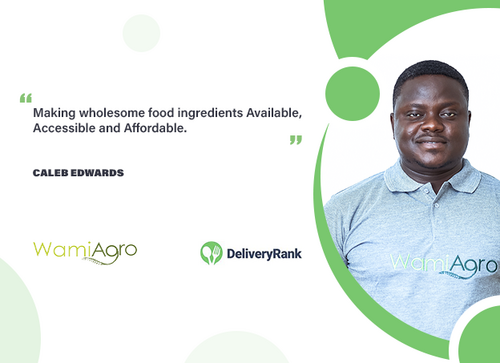Wami Agro Limited is a Ghana-based agritech company dedicated to empowering smallholder farmers through sustainable, high-yield production. Since its founding in 2020, the company has provided input credit, fair trade market access, and farmer education to strengthen resilience and improve livelihoods.
With a network of over 14,000 farmers across six regions of Ghana, WamiAgro supports the cultivation of rice, maize, soya beans, sorghum, vegetables, and root tubers, supplying quality produce to FMCGs, bulk distributors, animal feed processors, and food service businesses in Ghana and beyond.
DeliveryRank features an interview with Caleb Edwards, Managing Director of WamiAgro.
Transforming Livelihoods Through Innovation
How have WamiAgro's services, particularly Wami Credit, Wami Market, and Wami Info, transformed the livelihoods of smallholder farmers, and what measurable improvements have you observed in their productivity and income levels?
Over the past five years, we've deployed our interventions to more than 5,000 farmers across six regions in Ghana. Third-party research firms have tracked the impacts, and the feedback—both external and internal—is fascinating. One of the most interesting findings is that our interventions, particularly Wami Credit, often reach unbanked farmers who are experiencing formal credit for the first time.
These farmers typically lack access to the banking and financial system, so providing them with Wami Credit gives them a tangible experience of financial inclusion. Beyond financial access, our interventions help farmers build resilience in the face of harsh climate conditions. We equip them with the knowledge and resources to increase their production, and we guarantee profitable markets for their yields.
"To date, we have engaged over 15,000 farmers, 62% of whom are women. Remarkably, we maintain a 90% retention rate, with farmers returning each cycle for further support because the impact is real."
Many farmers are able to double their land productivity with our interventions, and we also significantly reduce post-harvest losses. By purchasing their produce at harvest, we relieve them of the burden of storage and distribution, cutting losses from over 40% to less than 2%.
The Pukpara Platform: Digital Transformation in Agriculture
How does the Pukpara platform enhance farmers' access to markets, credit facilities, and capacity-building resources, and what feedback have you received regarding its usability and impact?
WamiAgro delivers its farmer-focused interventions—Wami Credit, Wami Info, and Wami Market—through its digital platform known as Pukpara. This super app provides farmers with a unique digital ID, enabling traceability of farms, yields, and transactions, while also streamlining engagement between farmers, markets, and financial institutions.
Key Platform Features:
- Wami Info: Vital agronomic, climate-smart, and financial literacy information
- Wami Credit: Input financing for unbanked farmers
- Wami Market: Direct farm-gate connections to buyers
By combining data-driven tools, satellite monitoring, and digital financial inclusion, Pukpara empowers smallholder farmers with knowledge, credit, and market access—transforming them into active participants in sustainable and profitable food systems.
Expansion Across Sub-Saharan Africa
What strategies are in place to ensure a smooth expansion into neighboring countries like Sierra Leone and Burkina Faso, and how do you plan to adapt your services to meet the unique agricultural challenges in these regions?
I've traveled across these countries and can confirm that their challenges are very similar. In fact, across sub-Saharan Africa, smallholder farmers—about 250 million of them—face the same fundamental problems: difficult access to markets, lack of technical information, and very limited access to structured financing.
Over the past five years in Ghana, we've piloted and tested the Pukpara platform and achieved strong product–market fit. The solution works, and now we are ready to scale. From 2026 onward, our strategy is to franchise the Pukpara platform through local partnerships.
These partners will bring deep local knowledge, while we provide the platform, training, and licensing. This ensures replication of our model in each country while adapting to local realities.
Sustainable Farming and Environmental Impact
Can you provide examples of sustainable farming practices promoted among your network of farmers, and how do you measure and report the environmental impact of these initiatives?
This is a matter of great concern to us because smallholder farmers often use the same piece of land year after year without sustainable interventions. At Wami Agro, we begin by focusing on the soil—the most valuable resource a farmer has.
Measurable Results:
- Average yield increase: 30%
- Potential to double or triple production within 5 years
- Post-harvest losses reduced from 40% to less than 2%
We train farmers, run soil tests, and help them understand the current state of their land and how to enhance its productivity. We also focus on transforming farm waste into biochar or compost, enriching the soil with organic matter and improving essential nutrients such as phosphates and nitrogen.
Strategic Partnerships and Future Vision
How do partnerships, such as Acumen's investment under the Trellis initiative, enhance your capabilities, and what is your vision for WamiAgro over the next five to ten years?
I could spend an entire day talking about the benefits we've derived from partnerships with organizations such as Acumen. The impact is enormous—not just in terms of financial support, but in the validation they bring.
"When you have a badge like Acumen, MPT Capital, One Gara Green Ventures, or the Mastercard Foundation, the ecosystem immediately recognizes your seriousness."
Impact to Date:
- 20,000 tonnes of essential food items produced and distributed
- Over 31 direct jobs created
- More than 3,000 indirect jobs facilitated
- 15,000+ farmers engaged (62% women)
- 90% retention rate across farming cycles
WamiAgro may only be five years old, but we have the backing of organizations with decades—even centuries—of experience. This validation empowers us to execute our ideas and innovations, generating the tangible results we see today.
The satisfaction of visiting rural communities and seeing the outcomes firsthand is immense. Government resources are limited, so partnerships between nonprofits and development institutions are critical—they help find the sweet spot where profit meets purpose.
